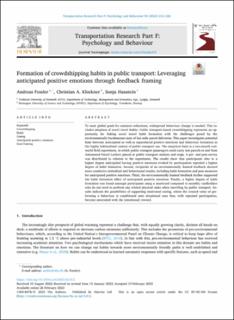| dc.contributor.author | Fessler, Andreas | |
| dc.contributor.author | Klöckner, Christian Andreas Nikolaus | |
| dc.contributor.author | Haustein, Sonja | |
| dc.date.accessioned | 2023-09-08T07:18:57Z | |
| dc.date.available | 2023-09-08T07:18:57Z | |
| dc.date.created | 2023-03-13T10:10:57Z | |
| dc.date.issued | 2023 | |
| dc.identifier.citation | Transportation Research Part F: Traffic Psychology and Behaviour. 2023, 94 212-226. | en_US |
| dc.identifier.issn | 1369-8478 | |
| dc.identifier.uri | https://hdl.handle.net/11250/3088085 | |
| dc.description.abstract | To meet global goals for emission reductions, widespread behaviour change is needed. This includes adoption of novel travel habits. Public transport–based crowdshipping represents an opportunity for linking novel travel habit formation with the challenges posed by the environmentally burdensome state of last-mile parcel deliveries. This paper investigates potential links between anticipated as well as experienced positive emotions and behaviour formation in the highly habitualised context of public transport use. The empirical basis is a two-month real-world field experiment, in which public transport passengers could carry test parcels to and from Automated Parcel Lockers placed at public transport stations and stops. A pre- and post-survey was distributed in relation to the experiment. The results show that participants who to a higher degree anticipated having positive emotions evoked by participation reported a higher degree of habit formation. Second, recipients of an environmentally framed feedback showed more conducive attitudinal and behavioural results, including habit formation and post measures for anticipated positive emotions. Third, the environmentally framed feedback further supported the habit formation effect of anticipated positive emotions. Finally, a higher degree of habit formation was found amongst participants using a smartcard compared to monthly cardholders who do not need to perform any related physical tasks when travelling by public transport. Results indicate the possibilities of supporting motivated cueing, where the reward value of performing a behaviour is conditioned onto situational cues that, with repeated participation, become associated with the (emotional) reward. | en_US |
| dc.language.iso | eng | en_US |
| dc.rights | Attribution-NonCommercial-NoDerivatives 4.0 Internasjonal | * |
| dc.rights.uri | http://creativecommons.org/licenses/by-nc-nd/4.0/deed.no | * |
| dc.title | Formation of crowdshipping habits in public transport: Leveraging anticipated positive emotions through feedback framing | en_US |
| dc.title.alternative | Formation of crowdshipping habits in public transport: Leveraging anticipated positive emotions through feedback framing | en_US |
| dc.type | Peer reviewed | en_US |
| dc.type | Journal article | en_US |
| dc.description.version | publishedVersion | en_US |
| dc.source.pagenumber | 212-226 | en_US |
| dc.source.volume | 94 | en_US |
| dc.source.journal | Transportation Research Part F: Traffic Psychology and Behaviour | en_US |
| dc.identifier.doi | 10.1016/j.trf.2023.02.012 | |
| dc.identifier.cristin | 2133386 | |
| cristin.ispublished | true | |
| cristin.fulltext | original | |
| cristin.qualitycode | 1 | |

